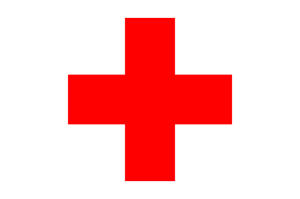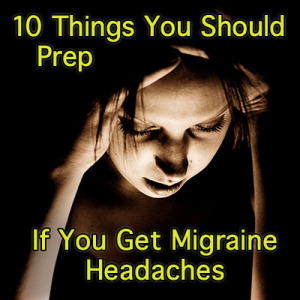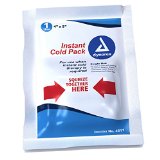10 Things to Prep if You Get Migraine Headaches
Individuals enduring migraine headaches often experience incapacitating symptoms. During extended emergencies, this condition can place sufferers at a significant disadvantage. Although the specific triggers behind migraines are yet to be definitively determined, most medical professionals believe they stem from spasm activities within the brain’s large blood vessels.
A severe migraine can leave an individual helpless, posing a risk not only to themselves but potentially burdening others during protracted emergencies. Hence, it is imperative for a contingency plan to manage these intense headaches, particularly when external medical interventions are not readily accessible.
Although no definitive cures are mentioned here, an exploration and study of these treatments and supplements might provide a semblance of relief, enabling functionality. When tackling migraines, identifying any form of effective treatment can prove more beneficial than having no solutions. A few of these solutions are explored below:
 Stocking Prescription Migraine Medication
Stocking Prescription Migraine Medication
Typically, those struggling with chronic migraines are treated with prescription medications after exhausting other alternatives. Commonly prescribed drugs, like Sumatriptan (Imitrex), must be administered at the first signs of a headache to achieve maximum efficacy. Alternatively, certain medications aim to prevent the onset of migraines and are taken daily.
Regardless of your medication type, having a supply on hand could be invaluable. In the likely event that your doctor is unwilling to prescribe you enough medication to have reserve supply you can try setting aside a little bit of meds on each refill yourself. For example if you have an ongoing prescription and it is eligible for a refill, but you aren’t out of migraine meds yet – you can choose to refill it right away and stash the few extra doses aside. Over time you can build a small stockpile in this manner for emergencies (even then use it ONLY as directed by your medical professional).
Natural and Over the Counter Medicine
Knowing that even a stock pile of prescription medication will only last so long it would only benefit migraine sufferers to explore other natural treatments and preventatives as well as pinpointing migraine triggers. Here are some things I have tried myself with limited success (as always please consult a medical professional before beginning any new treatment or vitamin regimen):
Magnesium, delivered through Epsom Salts, is often employed to treat migraines. The theory posits that magnesium deficiencies trigger many migraines; epidermal absorption of magnesium through a patch or an Epsom salt bath can help. Besides, Epsom salts are versatile and make a practical stock item.
If epsom salt baths aren’t your thing, and a patch doesn’t sound fun you can try taking 400 to 600 mg of magnesium a day. This has been suggested as the supplement dosage for migraine relief. This can be applied to prepping by stocking extra epsom salts, magnesium patches, or a magnesium supplements or all of the above. Adjustments in diet can also help to correct a magnesium deficiency.
Riboflavin (Vitamin B2), taken at a daily dosage of 400mg, is recognized for its potential as a preventive measure against migraines. Bear in mind, it may take up to three months to observe results, and it should not exceed the recommended daily allowance for pregnant women.
Coenzyme Q10, familiarly known as CoQ10, demonstrated promising results as an over-the-counter preventive option in a recent trial. Half of the participants experienced fewer migraines. Dosages ranged from 150 mg to 600 mg daily. Consult your physician before adding new supplements, as CoQ10 can interact with various medications.
Feverfew, a herbal supplement, shows potential for both migraine treatment and prevention. It can be grown at home or bought online and at health food stores. While the dry capsules are effective, direct consumption of raw plant leaves provides an enhanced benefit. Proceed with caution, as some people may experience mouth sores or loss of taste, and it’s not recommended for pregnant or nursing individuals.
Another valuable herbal supplement is Butterbur, used for treating and preventing migraines. While the plant can be grown domestically, it’s essential to only consume commercially processed and detoxified butterbur root extract due to potential toxicity. Please ensure the product is certified and labelled “PA-free.”
Peppermint Tea – Can help settle your stomach during a migraine, and while it doesn’t seem to help the pain I would like to note that it does seem to help the pain of a normal headaches. Ginger tea will also help with nausea. Peppermint is exceedingly easy to grow, has many many other uses and is a great addition to any herb garden.
Peppermint Essential Oil – Rubbed on to the temples seems to help sooth the pain of a migraine and shorten the length of it when used in combination with regular medication. I have no idea why this works, but it does for me. TIP: Peppermint essential oil will be more well tolerated by your skin if it is slightly diluted with a carrier oil. If you grow your own peppermint you can make a peppermint ‘oil infusion’ that will also work for this application.
Instant Cold Packs – At the base of the head. Heat will help a tension headache but it seems to only aggravate migraines. Cold has been shown to be the trick to helping with migraines. Instant cold packs (ice created by a chemical reaction) gives a person access to an ice pack even in the absence of electricity. Instant cold packs can be found online, in the pharmacy section of your grocery store or big box store and (my favorite place) the dollar store in the first aid section!
Over The Counter (OTC) Drugs – Some migraine headaches do respond to OTC medicine. Among them acetaminophen (Tylenol), ibuprofen (Advil) and caffeine seems the most effective. Another OTC migraine product, Excedrin Migraine, is a combination of Aspirin, Acetaminophen and Caffeine. Prepping these will expand your arsenal of treatments (be careful using ibuprofen and other OTC drugs to treat migraines – many claim to suffer from bad rebound headaches after taking large amounts of OTC drugs to treat migraines).
Sunglasses offer a simple yet effective solution to light sensitivity – a common symptom experienced by migraine sufferers. Maintaining spare pairs of large sunglasses, typically available at dollar stores can mitigate discomfort when a dark, quiet room is inaccessible.
Treatment Area
A dark quiet room, with the window open (shades drawn but window open if it is cool outside) is really one of the best treatments for a migraine once it has hit – the thing is, people try to tough it out, this will be especially tempting in the midst of an prolonged emergency. Toughing it out only makes a migraine worse and last longer (taking you out of commission for an even longer period of time), making yourself go rest in a quiet dark room will almost always reduce the intensity and length of the migraine and get you back to your normal helpful self faster.
Supply Storage
Keep your migraine treatment essentials in your emergency first aid kits and ensure a regular rotation to prevent degradation. Herbal and vitamin supplements tend to decompose faster than over-the-counter (OTC) medications like Advil, which retain their efficacy for years beyond expiry dates. Utilize older resources as needed and consistently renew them, thereby maintaining at least a year’s supply in your inventory.
Preparedness demands perpetual use and non-wastage of supplies. Protect essential oils, vitamins, and herbs from heat and sunlight by storing them in dark bottles. Seal Epsom salts in waterproof containers to safeguard them from moisture. For an insightful read on storing Vitamins for Emergency Preparedness and the ways to do it, follow this link.
Please note: Although I frequently experience migraines, I am not a certified medical expert or legal advisor. Always seek professional medical counsel before commencing any new treatments for your migraine headaches.




